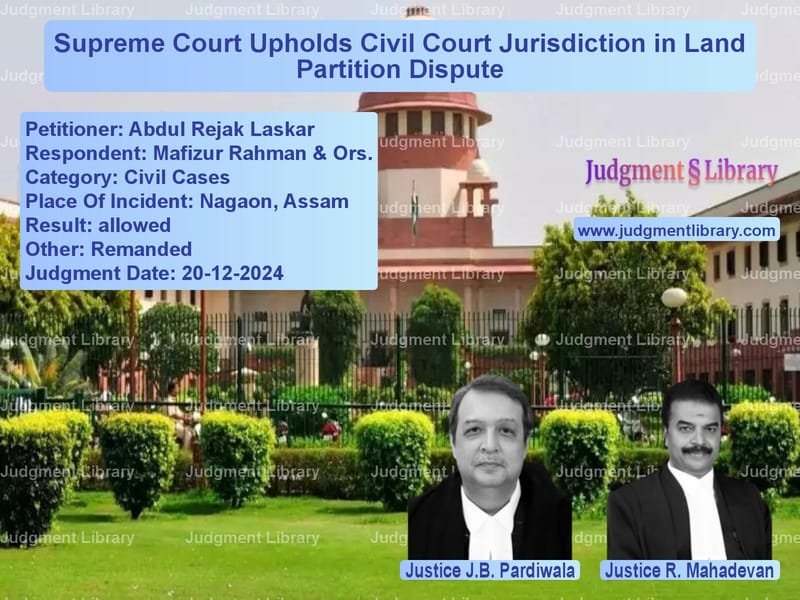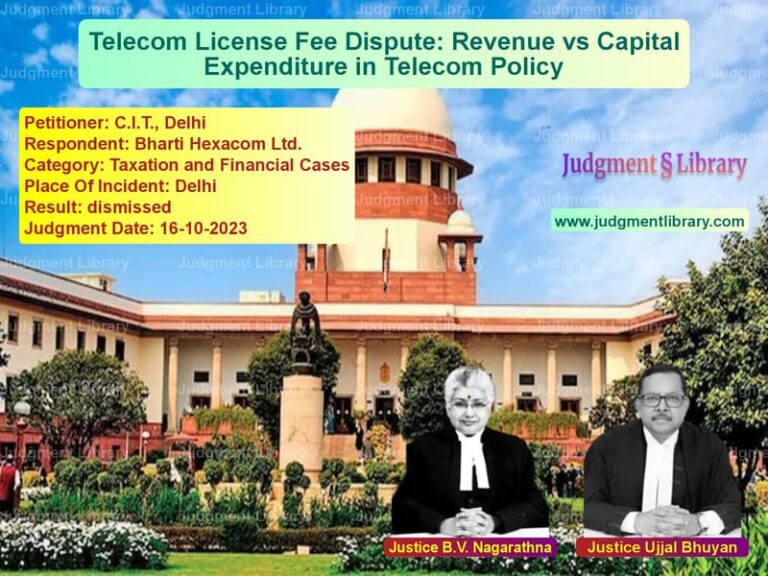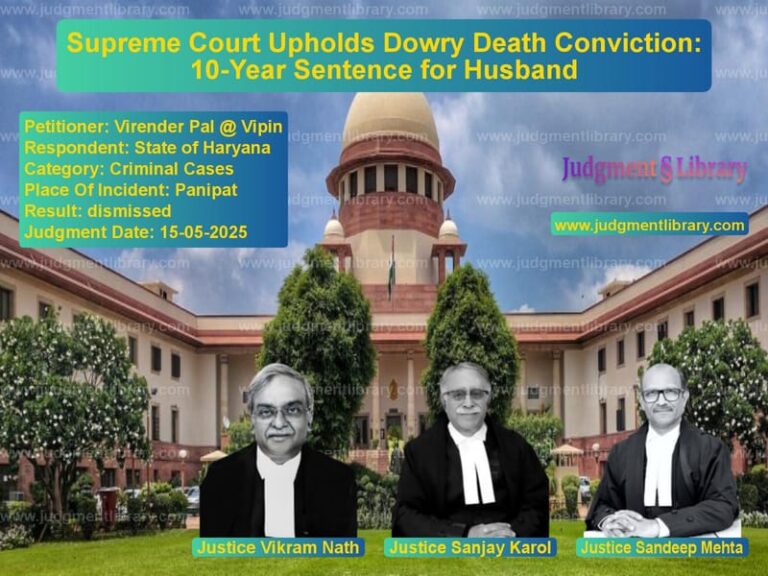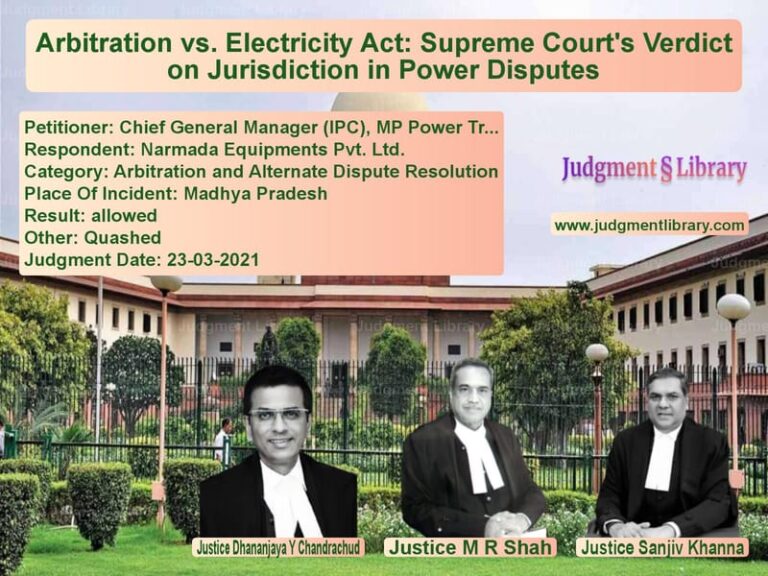Supreme Court Upholds Civil Court Jurisdiction in Land Partition Dispute
The Supreme Court of India has delivered a significant judgment in the case of Abdul Rejak Laskar vs. Mafizur Rahman & Ors., clarifying the jurisdiction of civil courts in land partition disputes. The Court overturned a Gauhati High Court ruling and reinstated the judgment of the Civil Judge, Nagaon, allowing the appellant’s claim for partition of his purchased land.
Background of the Case
The dispute centered on a land partition claim involving 1 katha 5 lechas of land in Nagaon, Assam. The key events were:
- In 1973, the original defendants inherited 2 katha 10 lechas of land from Javed Ali.
- In 1977, one of the defendants sold 1 katha 5 lechas of his share to the plaintiff, Abdul Rejak Laskar.
- The plaintiff took possession but was later allegedly dispossessed by the defendants.
- In 1979, the plaintiff filed a title suit (TS 67/79) seeking confirmation of his ownership.
- In 1981, the trial court ruled in favor of the plaintiff, but the case was remanded due to non-joinder of necessary parties.
- In 1990, the retrial dismissed the suit despite recognizing the plaintiff’s ownership.
- The plaintiff appealed, and in 1993, the appellate court granted joint possession but advised him to seek partition separately.
- In 1999, he filed for imperfect partition under the Assam Land and Revenue Regulation, 1886, which was rejected due to lack of actual possession.
- In 2004, he filed a new title suit (TS 83/2004) for partition, which the trial court dismissed in 2011.
- In 2014, the appellate court ruled in favor of the plaintiff, directing partition.
- In 2022, the Gauhati High Court reversed the decision, holding that civil courts lacked jurisdiction.
Supreme Court’s Ruling
A bench comprising Justices J.B. Pardiwala and R. Mahadevan examined whether the High Court erred in applying Section 154(1)(e) of the Assam Land and Revenue Regulation, 1886, which restricts civil court jurisdiction in revenue matters.
1. Civil Courts Have Jurisdiction in Title and Partition Disputes
The Supreme Court ruled that Section 154(1)(e) does not bar civil courts from deciding title disputes or partition claims when revenue authorities refuse to act.
“Where the ingredients for invoking the remedy of imperfect partition under Section 97 are absent, the bar contained in Section 154(1)(e) does not apply.”
2. Plaintiff’s Right to Partition Is Legally Justified
The Court upheld the appellate court’s ruling that since the plaintiff had already obtained a joint possession decree, he was entitled to claim separate possession.
“A party cannot be left remediless after a decree confirming their title and possession.”
3. Revenue Authorities’ Rejection Does Not Bar Civil Court
The revenue authorities had refused partition due to lack of possession, but the Supreme Court held that this did not prevent the civil court from granting relief.
“The refusal by the revenue authority does not mean the plaintiff loses his right to claim partition through the civil court.”
4. High Court Misinterpreted Section 154(1)(e)
The Supreme Court criticized the High Court’s interpretation, stating:
“The High Court erroneously held that the civil court lacked jurisdiction despite the absence of any valid ground under Section 154.”
Final Judgment
The Supreme Court ruled:
- The High Court’s decision was set aside.
- The Civil Judge’s ruling in favor of the plaintiff was restored.
- The plaintiff is entitled to partition and separate possession of his land.
- The trial court must issue a precept to revenue authorities to execute the partition.
Implications of the Judgment
The ruling has major implications for land partition disputes in India:
1. Clarifies Civil Court Jurisdiction
The judgment affirms that civil courts can intervene in partition cases if revenue authorities refuse to act.
2. Protects Property Rights
The decision ensures that property buyers with valid sale deeds are not left without legal recourse.
3. Prevents Misuse of Revenue Laws
State authorities cannot arbitrarily refuse partition and force plaintiffs into legal limbo.
Conclusion
The Supreme Court’s ruling in Abdul Rejak Laskar vs. Mafizur Rahman & Ors. reinforces the principle that landowners with legally acquired property have the right to claim partition through civil courts. The decision protects individuals from procedural barriers imposed by revenue authorities and ensures that rightful owners can take possession of their land.
Petitioner Name: Abdul Rejak Laskar.Respondent Name: Mafizur Rahman & Ors..Judgment By: Justice J.B. Pardiwala, Justice R. Mahadevan.Place Of Incident: Nagaon, Assam.Judgment Date: 20-12-2024.
Don’t miss out on the full details! Download the complete judgment in PDF format below and gain valuable insights instantly!
Download Judgment: abdul-rejak-laskar-vs-mafizur-rahman-&-ors-supreme-court-of-india-judgment-dated-20-12-2024.pdf
Directly Download Judgment: Directly download this Judgment
See all petitions in Property Disputes
See all petitions in Landlord-Tenant Disputes
See all petitions in Contract Disputes
See all petitions in Judgment by J.B. Pardiwala
See all petitions in Judgment by R. Mahadevan
See all petitions in allowed
See all petitions in Remanded
See all petitions in supreme court of India judgments December 2024
See all petitions in 2024 judgments
See all posts in Civil Cases Category
See all allowed petitions in Civil Cases Category
See all Dismissed petitions in Civil Cases Category
See all partially allowed petitions in Civil Cases Category







